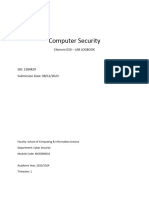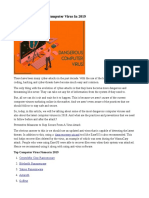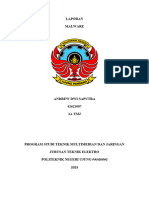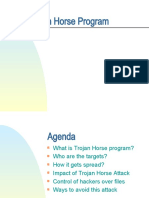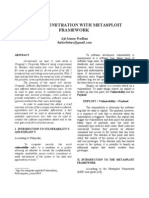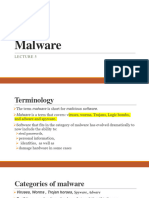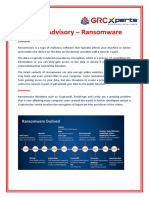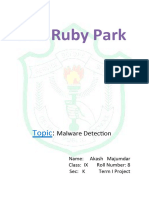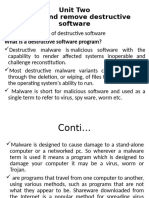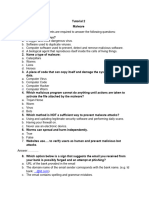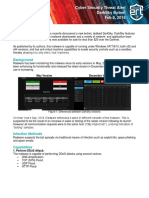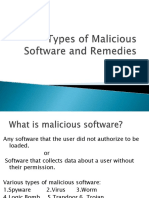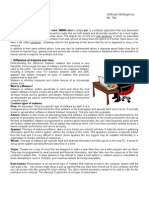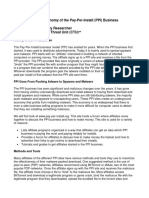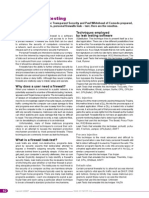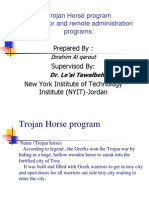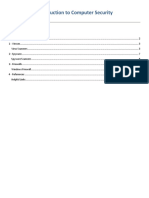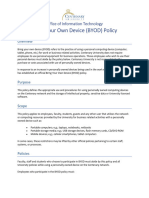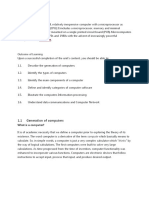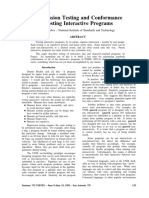MODULE - 6 Trojan, Backdoor, Virus and Countermeasure
MODULE - 6 Trojan, Backdoor, Virus and Countermeasure
Uploaded by
Vallenshia Vaezera UaatjoCopyright:
Available Formats
MODULE - 6 Trojan, Backdoor, Virus and Countermeasure
MODULE - 6 Trojan, Backdoor, Virus and Countermeasure
Uploaded by
Vallenshia Vaezera UaatjoOriginal Title
Copyright
Available Formats
Share this document
Did you find this document useful?
Is this content inappropriate?
Copyright:
Available Formats
MODULE - 6 Trojan, Backdoor, Virus and Countermeasure
MODULE - 6 Trojan, Backdoor, Virus and Countermeasure
Uploaded by
Vallenshia Vaezera UaatjoCopyright:
Available Formats
MODULE- 06: Trojan, Backdoor &Virus & Countermeasures
Objective of the Module
objective of this Module is to understand about Trojan, Backdoor and Viruses, Suggesting &
Implementing Countermeasures
Trojan, Backdoor &Virus
What is Trojan?
A Trojan is a program that is usually appears to be something useful but when it is
executed, it installs malicious programs on your computer, having back door capabilities. A
Trojan is used to gain backdoor access to a user's system. Trojans are used to create a
backdoor on victim’s computer that gives attacker to access to the victim’s machine.
A Trojan consist of spy ware program and other programs that: monitor traffic and
keystrokes; create a backdoor into the system for the hacker's use; alter log files; attack other
machines on the network; and alter existing system tools to escape detection
A Trojan exists for a variety of operating systems, such as Microsoft Windows, Linux,
and Solaris.
What is Backdoor?
A backdoor is an unauthorized entry or way to get access to a computer system it is
setup by an attacker (malicious user) into a computer system to facilitate unauthorized access
to the system. Backdoors are created using a Trojan program on a system to facilitate illegal
remote access. Using a backdoor an attacker can gain access to a computer remotely and
can take basic control (i.e. for Linux root access, for Windows, Administrator or Admin access)
of a computer system, without the system's owner’s permission
What is Virus?
A virus is a self-replicating program that can copy itself and infect a computer without
the permission /knowledge of the owner. The insertion of the virus into a program or file is
termed as infection. It attaches itself to a program or file enabling it to spread from one
computer to another, leaving infections as it travels. Most of the viruses attach to executable
files and their malicious operation begins when you run or open the executable file
Virus developers can have several reasons for creating and spreading viruses. Viruses have
been created as research projects, to attack the software of companies, and to distribute some
messages.
NIELIT, Gorakhpur | Trojan, Backdoor & Virus 1
A Scenario For Trojan, Backdoor & Virus
Scenario
Mr. ABC is a technical support executive in IT Technologies. The company uses
an intranet based Mail and Web server for intra office communications. Mr. XYZ is senior manager in
the same organization and is reporting officer of Mr. ABC.
Now Mr. ABC sends an email to his manager Mr. XYZ containing aTrojan program to
create a backdoor to obtain all the information of manager’s system.
For this a scenario has been designed to show how Mr. ABC installs the Trojan program
on manager’s system and takeover the complete control of Manager‘s system.
The steps listed in the lab manual shows how Mr. ABC could configure a Trojan program
and send it to Mr. XYZ to take control of manager‘s system.
Hands on Lab for Trojan, Backdoor & Virus
Tools Used
ProRat (Program for creating a Trojan application)
ProRat is a Windows based backdoor trojan horse, more commonly known as a RAT (Remote
Administration Tool). As with other trojan horses it uses a client and server. ProRat opens a port
on the computer which allows the client to perform numerous operations on the server (the
machine being controlled). ProRat is known for its server to be almost impossible to remove
without updated antivirus software.
Machine Details for this Lab
Sr.no Machine IP Address User Login Password
.
1 CentOS 6.4 (Mail server) 10.0.0.13 root 12345678
2 Windows7 (Attacker) 10.0.0.12 nielit 123
3 Win-7 clone (Victim) 10.0.0.15 nielit 123
NIELIT, Gorakhpur | Trojan, Backdoor & Virus 2
Hands on Lab
Creating And Performing Backdoor Intrusion With The Help Of Trojan
Program
Following steps would be used to create the trojan application using "ProRat" tool
1. From "Windows7" (10.0.0.12) desktop and browse to "prorat_v1.9" folder
2. Run "ProRat" application as administrator.
3. Create ProRat Server application to be used as "trojan", by navigating through "Create->
Create ProRat Server (342 kbayt)” as shown below.
NIELIT, Gorakhpur | Trojan, Backdoor & Virus 3
4. Click on “General Settings” button and fill the following information with default settings:
▪ Server Port : "5110" [Specify port on which trojan will listen to request]
▪ Server Password: "12345678"[Specify password to be used to connect the trojan
application running on victim machine]
▪ victim Name: "victim" [Specify generic name for this application]
5. Now click on " Server Extensions " button and select the "Server Extension(Has icon
support)" to specify the file extension of trojan server application along with its icon.
6. Now click on "Server Icon" and select a appropriate icon image for trojan application .
7. Click on "Create Server" to create the trojan application with file name "server.exe" would be
created. Minimize the Prorat window.
NIELIT, Gorakhpur | Trojan, Backdoor & Virus 4
8. Now browse to prorat directory(Desktop/ProRat/run/) where a file with name"server.exe"
would be created .This file would be sent by malicious user to victim
(bankmanager@cordial.com).
Following steps would be used by maliciuos user to send the created
trojan application through e-mail to the victim
9. From Windows7(10.0.0.12) machine, browse to "http://10.0.0.13" [a web based mail service
to be used for send e-mail] .
10. Login to e-mail service using following credentials
User: client1@test.com
Password: 12345678
Now compose a mail for victim user ,in this scenario the trojan application “server.exe”
would be sent to "bankmanager@cordial.com”[e-mail id of victim user] .Attach the
"server.exe" file and send the e-mail message as shown below
NIELIT, Gorakhpur | Trojan, Backdoor & Virus 5
Following steps would be used by victim user to download trojan application sent by
malicious user through e-mail
11. As a victim user, Switch to "Win-clone" (10.0.0.15) machine and open the mail service by
browsing ""http://myserver.domain.com" as shown below:
12. Login to e-mail service using following credentials
Username : bankmanager@cordial.com
Password : 12345678
13. Now check the mail sent by user "client1@test.com" ,and download the attached file
“server.exe” as shown below.
NIELIT, Gorakhpur | Trojan, Backdoor & Virus 6
14. Now the victim user would try to execute the downloaded file which is saved in "Downloads"
folder. Now click on downloaded file "server.exe". By clicking this malicious file, the
"server.exe" trojan application would install on the victim's machine without the permission
of user.
Following steps would be used by malicious user to make connection to victim's
machine using trojan application and thus take complete control over the target
machine.
15. As a malicious user ,switch to Windows7 (10.0.0.12) and execute ProRat application to
connect the target machine with following IP address and Port No:
IP Address:10.0.0.15 [IP Address of win-7 i.e. victim's machine]
Port No: 5110 [Specify Port no. on which the trojan is running]
16. Enter password "12345678" as specified in previous step and click on "OK" button.
17. Now click on run and click on notepad, again click on Run as following.
NIELIT, Gorakhpur | Trojan, Backdoor & Virus 7
18. Switch to Win-clone (10.0.0.15) and notepad would be appear.
Outcomes
In this lab the participant has performed the following:
▪ Created a backdoor application using ProRat tool on behalf of attacker.
▪ Sent the file containing a backdoor application via e-mail as attacker.
▪ Download and installed the backdoor application on victim machine.
▪ Connected to victim machine using ProRat application as attacker.
▪ Attacker gains complete control over Victim Machine.
NIELIT, Gorakhpur | Trojan, Backdoor & Virus 8
Implementing the countermeasure to create a secured environment
The following steps would be performed by user on Windows7(10.0.0.15)to set up
firewall.
19. Switch to the Windows7(10.0.0.15)machine open the “Control Panel” and click on Windows
Firewall.
20. Click on Restore Defaults
21. Click on Yes button. Firewall is now enabled on Win-clone (10.0.0.15) machine.
NIELIT, Gorakhpur | Trojan, Backdoor & Virus 9
22. Switch to Windows7(10.0..12)Machine and connect again by clicking on Connect button on
Prorat.
23. But this time it will not prompt for the password as it cannot connect to client side agent
because firewall on Win-Clone (10.0.0.15)machine is now blocking access.
NIELIT, Gorakhpur | Trojan, Backdoor & Virus 10
Lab Outcomes
In this lab the participant has done the following:
• Enabled Firewall on Victim's machine to disable untrusted services.
• The connection to Backdoor application failed after enabling firewall as a
countermeasure.
Suggested More Countermeasures
1. Always use Anti-Virus software on machine and regularly update the Anti Virus software
to be able to detect the presence of infection.
ProRat server usually detected as Trojan.Dropper.Prorat.DZ.29, Dropped:
Backdoor.Prorat.DZ
NIELIT, Gorakhpur | Trojan, Backdoor & Virus 11
You might also like
- FANS C Familiarization Course - 27032024No ratings yetFANS C Familiarization Course - 270320243 pages
- Advice From A Real Hacker - How To Know If You'Ve Been Hacked Null ByteNo ratings yetAdvice From A Real Hacker - How To Know If You'Ve Been Hacked Null Byte16 pages
- Common Windows, Linux and Web Server Systems Hacking TechniquesFrom EverandCommon Windows, Linux and Web Server Systems Hacking TechniquesNo ratings yet
- Cyber Threat: Latest Computer Virus in 2019: Data Recovery WizardNo ratings yetCyber Threat: Latest Computer Virus in 2019: Data Recovery Wizard8 pages
- Principal Security Engineer and Security Researcher: Filipi Pires100% (1)Principal Security Engineer and Security Researcher: Filipi Pires19 pages
- System Penetration With Metasploit Framework: Ajit Kumar PradhanNo ratings yetSystem Penetration With Metasploit Framework: Ajit Kumar Pradhan5 pages
- Task 1:: Run The Vmware Workstation and Click On Create A New Virtual Machine OptionNo ratings yetTask 1:: Run The Vmware Workstation and Click On Create A New Virtual Machine Option24 pages
- © 2018 Caendra Inc. - Hera For Ptpv5 - Post-ExploitationNo ratings yet© 2018 Caendra Inc. - Hera For Ptpv5 - Post-Exploitation17 pages
- Analiză A Impactului Sistemelor de Detecție A Intrușilor Asupra Sistemului de CalculNo ratings yetAnaliză A Impactului Sistemelor de Detecție A Intrușilor Asupra Sistemului de Calcul7 pages
- 1563881800unit 2 Malware and Its Types EDITSNo ratings yet1563881800unit 2 Malware and Its Types EDITS8 pages
- SCTS 242: Network Intrusion Detection and Penetration TestingNo ratings yetSCTS 242: Network Intrusion Detection and Penetration Testing21 pages
- Cyber Security Threat Alert Darksky Botnet Feb 8, 2018: May Version December VersionNo ratings yetCyber Security Threat Alert Darksky Botnet Feb 8, 2018: May Version December Version5 pages
- Part B - Micro-Project Proposal Title - Study Any Trojan Attack. Identify The Trojan AttackNo ratings yetPart B - Micro-Project Proposal Title - Study Any Trojan Attack. Identify The Trojan Attack10 pages
- The Faces of Computer Malware: by Michael P. KassnerNo ratings yetThe Faces of Computer Malware: by Michael P. Kassner15 pages
- Jasmin Espiritu Artificial Intelliegence Bscs 4A Mr. Tan: What Is A Bot?No ratings yetJasmin Espiritu Artificial Intelliegence Bscs 4A Mr. Tan: What Is A Bot?2 pages
- Eccouncil Ecihv2 4 1 1 Preparation For Handling Malware IncidentsNo ratings yetEccouncil Ecihv2 4 1 1 Preparation For Handling Malware Incidents3 pages
- BlackHat DC 2010 Stevens Underground WPNo ratings yetBlackHat DC 2010 Stevens Underground WP23 pages
- Penetrating Windows 8 With Syringe UtiliNo ratings yetPenetrating Windows 8 With Syringe Utili5 pages
- Malware: CC101 - Introduction To ComputingNo ratings yetMalware: CC101 - Introduction To Computing11 pages
- Log In: Upload Files Folder Files Open Folder UploadNo ratings yetLog In: Upload Files Folder Files Open Folder Upload1 page
- MODULE - 3 Brute Force Attack CountermeasuresNo ratings yetMODULE - 3 Brute Force Attack Countermeasures11 pages
- I. Multiple Choice: Write The Letter of Your Answer Before Each NumberNo ratings yetI. Multiple Choice: Write The Letter of Your Answer Before Each Number3 pages
- Questão Do Batismo - Salomão L. Ginsburg by Memória Dos Batistas - IssuuNo ratings yetQuestão Do Batismo - Salomão L. Ginsburg by Memória Dos Batistas - Issuu1 page
- TNEB ECE Model Question Paper 1: B) InfiniteNo ratings yetTNEB ECE Model Question Paper 1: B) Infinite8 pages
- [FREE PDF sample] (Ebook) Mobile Computing: Technology, Applications And Service Creation by Hasan Et Al. Talukder, Asoke K & Ahmed ISBN 9780070144576, 0070144575 ebooksNo ratings yet[FREE PDF sample] (Ebook) Mobile Computing: Technology, Applications And Service Creation by Hasan Et Al. Talukder, Asoke K & Ahmed ISBN 9780070144576, 0070144575 ebooks76 pages
- Eproject Document: Leave Management SystemNo ratings yetEproject Document: Leave Management System34 pages
- Annaite Tire Co., Limited: Home Product About Contact Company Show SolutionNo ratings yetAnnaite Tire Co., Limited: Home Product About Contact Company Show Solution2 pages
- Arduino & Iot Monitoring Baby System - SignedNo ratings yetArduino & Iot Monitoring Baby System - Signed10 pages
- Instruction of TDL Transverse Flow Zipper Machine Control SystemNo ratings yetInstruction of TDL Transverse Flow Zipper Machine Control System29 pages
- G - ST - SDR V4.09.21 Version Upgrade Guide - R1.1No ratings yetG - ST - SDR V4.09.21 Version Upgrade Guide - R1.1131 pages
- John Lloyd Reyes Boa: Assets and CapabilitiesNo ratings yetJohn Lloyd Reyes Boa: Assets and Capabilities2 pages
- Regression Testing and Conformance Testing Interactive ProgramsNo ratings yetRegression Testing and Conformance Testing Interactive Programs10 pages
- Policy For Device Software Functions and Mobile Medical Applications Guidance For Industry and Food and Drug Administration StaffNo ratings yetPolicy For Device Software Functions and Mobile Medical Applications Guidance For Industry and Food and Drug Administration Staff45 pages
- Advice From A Real Hacker - How To Know If You'Ve Been Hacked Null ByteAdvice From A Real Hacker - How To Know If You'Ve Been Hacked Null Byte
- Common Windows, Linux and Web Server Systems Hacking TechniquesFrom EverandCommon Windows, Linux and Web Server Systems Hacking Techniques
- Cyber Threat: Latest Computer Virus in 2019: Data Recovery WizardCyber Threat: Latest Computer Virus in 2019: Data Recovery Wizard
- Principal Security Engineer and Security Researcher: Filipi PiresPrincipal Security Engineer and Security Researcher: Filipi Pires
- System Penetration With Metasploit Framework: Ajit Kumar PradhanSystem Penetration With Metasploit Framework: Ajit Kumar Pradhan
- Task 1:: Run The Vmware Workstation and Click On Create A New Virtual Machine OptionTask 1:: Run The Vmware Workstation and Click On Create A New Virtual Machine Option
- © 2018 Caendra Inc. - Hera For Ptpv5 - Post-Exploitation© 2018 Caendra Inc. - Hera For Ptpv5 - Post-Exploitation
- Analiză A Impactului Sistemelor de Detecție A Intrușilor Asupra Sistemului de CalculAnaliză A Impactului Sistemelor de Detecție A Intrușilor Asupra Sistemului de Calcul
- SCTS 242: Network Intrusion Detection and Penetration TestingSCTS 242: Network Intrusion Detection and Penetration Testing
- Cyber Security Threat Alert Darksky Botnet Feb 8, 2018: May Version December VersionCyber Security Threat Alert Darksky Botnet Feb 8, 2018: May Version December Version
- Part B - Micro-Project Proposal Title - Study Any Trojan Attack. Identify The Trojan AttackPart B - Micro-Project Proposal Title - Study Any Trojan Attack. Identify The Trojan Attack
- The Faces of Computer Malware: by Michael P. KassnerThe Faces of Computer Malware: by Michael P. Kassner
- Jasmin Espiritu Artificial Intelliegence Bscs 4A Mr. Tan: What Is A Bot?Jasmin Espiritu Artificial Intelliegence Bscs 4A Mr. Tan: What Is A Bot?
- Eccouncil Ecihv2 4 1 1 Preparation For Handling Malware IncidentsEccouncil Ecihv2 4 1 1 Preparation For Handling Malware Incidents
- Log In: Upload Files Folder Files Open Folder UploadLog In: Upload Files Folder Files Open Folder Upload
- I. Multiple Choice: Write The Letter of Your Answer Before Each NumberI. Multiple Choice: Write The Letter of Your Answer Before Each Number
- Questão Do Batismo - Salomão L. Ginsburg by Memória Dos Batistas - IssuuQuestão Do Batismo - Salomão L. Ginsburg by Memória Dos Batistas - Issuu
- [FREE PDF sample] (Ebook) Mobile Computing: Technology, Applications And Service Creation by Hasan Et Al. Talukder, Asoke K & Ahmed ISBN 9780070144576, 0070144575 ebooks[FREE PDF sample] (Ebook) Mobile Computing: Technology, Applications And Service Creation by Hasan Et Al. Talukder, Asoke K & Ahmed ISBN 9780070144576, 0070144575 ebooks
- Annaite Tire Co., Limited: Home Product About Contact Company Show SolutionAnnaite Tire Co., Limited: Home Product About Contact Company Show Solution
- Instruction of TDL Transverse Flow Zipper Machine Control SystemInstruction of TDL Transverse Flow Zipper Machine Control System
- G - ST - SDR V4.09.21 Version Upgrade Guide - R1.1G - ST - SDR V4.09.21 Version Upgrade Guide - R1.1
- Regression Testing and Conformance Testing Interactive ProgramsRegression Testing and Conformance Testing Interactive Programs
- Policy For Device Software Functions and Mobile Medical Applications Guidance For Industry and Food and Drug Administration StaffPolicy For Device Software Functions and Mobile Medical Applications Guidance For Industry and Food and Drug Administration Staff

